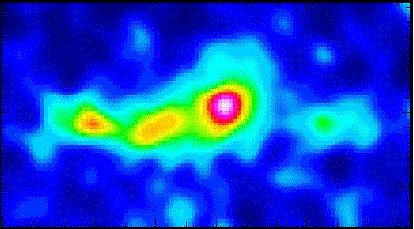
The Shapley Concentration is a supercluster of galaxies,
located in the Southern Hemisphere at a redshift going from z ~ 0.03 to
z ~0.05, and extending over several square degrees on the plane of the
sky. It is characterised by a very unrelaxed dynamical state (Bardelli
et al. 1994, Bardelli et al. 1998) and it is therefore an ideal laboratory
to study the properties and the consequences of cluster merging.
The central region of the Shapley Concentration includes two cluster
complexes.
One is formed A3556, A3558 and A3562, aligned almost orthogonal to
the line of sight, and containing mostly early-type galaxies (see top figure).
A3558 is the central and most massive cluster in the chain (richness
class R=4) and is dominated by a cD galaxy; A3562 is an intermediate richness
(R=2) cluster dominated by a cD galaxy with a very extended asymmetric
optical halo, and A3556 is the poorest cluster in the chain (R=0), with
the most intriguing optical properties (see Bardelli et al. 1998 for a
detailed discussion).
The cores of these three main clusters are connected by a stream of
poorer groups of galaxies. The spectroscopic and X-ray properties of the
whole A3558 complex make it very similar to cluster collision simulations
carried out by Roettiger et al. (1993), suggesting that a major merging
event may have just taken place between A3558 and another massive cluster,
which has partly crossed the core of A3558 (A3562) and has been partly
left behind (A3556) and is now merging with A3558.
The second group of clusters in the central region of the Shapley
Concentratio includes A3528, A3530 and A3532. There are several
pieces of evidence suggesting that the clusters in this complex are
in a pre-merging stage.
Radio Observations
We
have been observing the two cluster complexes in the Shapley Concentration
core at radio frequencies using the Australia Telescope Compact Array
(Narrabri, Australia) and the Very Large Array (Socorro, New Mexico)
at 20 cm and 13 cm. Furthermore we have been studying in detail the most
interesting extended radio galaxies we found in our survey.
Our aim is to derive the statistical properties of these clusters,
such as for example the bivariate radio-luminosity function, and compare them
to similar parameters in non-merging/relaxed clusters. This will allow us
to derive information on the effect of merging on the dynamics and evolution
of the cluster radio properties.
We are also studying in detail the extended radio galaxies, to derive
their physical properties, the properties of the external medium, and to
disentangle the geometry of the clusters.
Most relevant publications related to the radio study of the Shapley Concentration are:
![]() Venturi
T., Bardelli S., Zambelli G., Morganti R., Hunstead R.W.:
Radio Properties of the Shapley Concentration.
Venturi
T., Bardelli S., Zambelli G., Morganti R., Hunstead R.W.:
Radio Properties of the Shapley Concentration.
IV. The
Cluster Complex A3528, 2001,
MNRAS 324, 1131
![]() Venturi
T., Bardelli S., Morganti R., Hunstead R.W.: Radio Properties of
the Shapley Concentration.
Venturi
T., Bardelli S., Morganti R., Hunstead R.W.: Radio Properties of
the Shapley Concentration.
III. Merging
clusters in the A3558 Complex, 2000,
MNRAS 314, 594
![]() Venturi
T., Bardelli S., Morganti R., Hunstead R.W.: Radio Properties of
the Shapley Concentration.
Venturi
T., Bardelli S., Morganti R., Hunstead R.W.: Radio Properties of
the Shapley Concentration.
II. J1324-3138:
a remnant of a radio galaxy in the Abell cluster A3556?, 1998,
MNRAS 298, 1113
![]() Venturi
T., Bardelli S., Morganti R., Hunstead R.W.: Radio Properties of
the Shapley Concentration.
Venturi
T., Bardelli S., Morganti R., Hunstead R.W.: Radio Properties of
the Shapley Concentration.
I.
The Abell Cluster A3556, 1997, MNRAS
285, 898
![]() Venturi T., Bardelli S., Morganti R., Hunstead R.W.: Radio Continuum
Observations of the
Venturi T., Bardelli S., Morganti R., Hunstead R.W.: Radio Continuum
Observations of the
Abell
Cluster of Galaxies A3556, 1997, Astrophysical
Letters and Communications 36, 79
![]() Venturi T., Bardelli S., Morganti R., Hunstead R.W.: 1998,
Radio Survey of Merging Clusters in
Venturi T., Bardelli S., Morganti R., Hunstead R.W.: 1998,
Radio Survey of Merging Clusters in
the Shapley
Concentration, 1998, ESO/ATNF Workshop, p. 326
![]() Venturi T., Bardelli S., Zambelli G., Morganti R., Hunstead R.W.:
Radio Observations of
Venturi T., Bardelli S., Zambelli G., Morganti R., Hunstead R.W.:
Radio Observations of
Merging
Clusters in the Shapley Concentration
1999, in Diffuse Thermal and Relativistic Plasma in Galaxy
Clusters ,
Eds. H. Boehringer, L. Feretti & P. Schuecker, MPE Report 271, p.27
